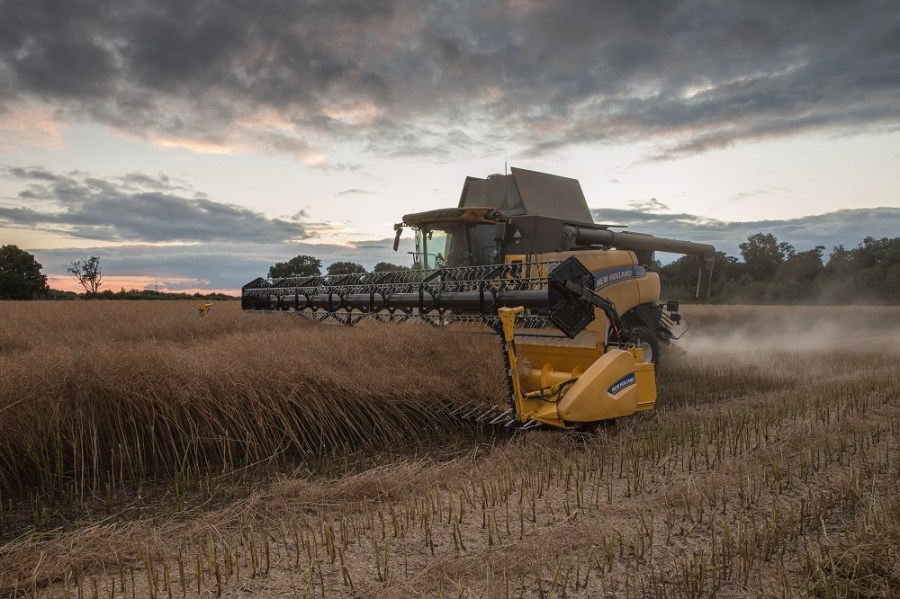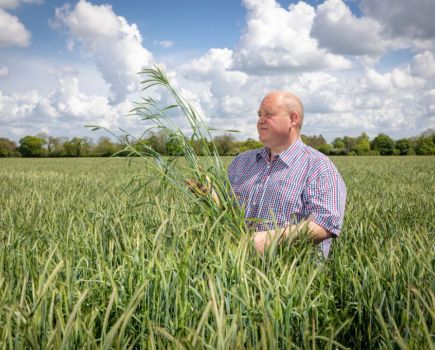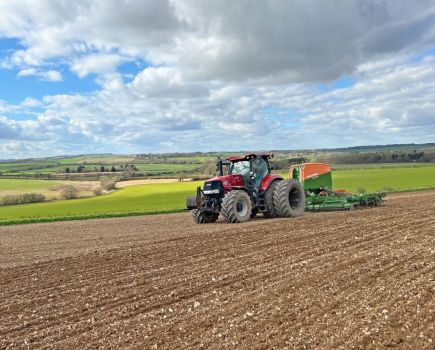Riding its way onto the UK oilseed rape scene, Django looks set to beat other varieties to the draw, spurring its way in with the highest gross output of all conventionals and hybrids on the market.
The variety’s 2% higher for gross output than anything that has gone before it.
By Melanie Jenkins
One of the first things to catch a grower’s attention is normally gross output, and in this respect, the latest conventional oilseed rape variety from KWS is sure to create quite a stir. Django currently sits at the top of the AHDB Recommended List candidate table, with a gross output at 110.3% of the control in the East/West region and 108.7% in the North. That puts it above any other available variety, be it conventional or hybrid, on or off the RL.
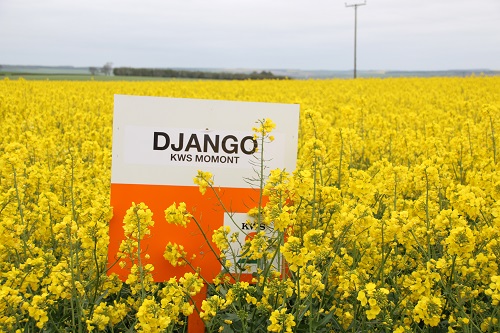
Django currently sits at the top of the AHDB East/West Candidate List, above any other available variety, be it conventional or hybrid, on or off the RL.
Django’s gross output isn’t its only advantageous trait, however. In addition, it has a robust disease package, good autumn vigour, strong standing ability and the potential to combine a high yield and oil content – all of which should be more than satisfactory to a number of growers, says breeder KWS.
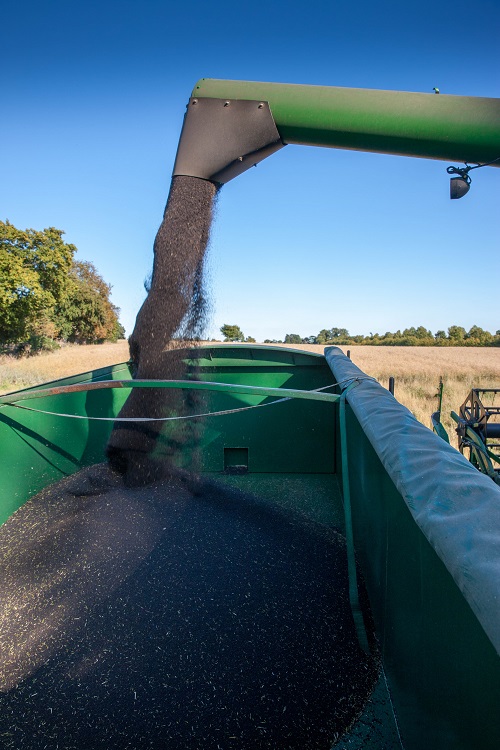
It yields 110% in the East and West and 108.6% in the North, with an oil content of 45.4%.
Maritime breeding
The variety has been drumming up considerable excitement, coming out top in National List trials, says Carl Gibbard, OSR breeder at KWS. What makes it even more special is that it’s a conventional variety out-yielding all hybrids. “Django was brought to the UK in 2012 to be grown in observation trials, when flea beetle started to become a real issue,” he adds. “However, it was only in single replicated trials so there was no yield data, but a lot of information was gathered on its disease, which looked really strong for stem canker.”
Simon Kightley at NIAB thinks Django is exceedingly promising. “It looks fantastic. When we put the two years of trial data into our long term analysis, the variety’s 2% higher for gross output than anything that has gone before it.”
The variety was bred as part of KWS’ Momont breeding programme which is based in France, explains Carl Gibbard. This programme specifically deals with maritime OSR breeding for the UK, France and Denmark. “Specific traits are selected that are best suited to the UK, as in France they like different characteristics, such as winter hardiness.”
Since Charger – which was the first variety specifically selected for the UK – varieties have been identified as suitable if they demonstrate early vigour, he adds. “Early vigour is a key trait for the UK and the very successful varieties, Campus and Charger, were selected as they have this. Listening to farmers and agronomists, we’ve been able to target what is needed in the UK environment.”
It did well in France so was then put into replicated trials in 2013/14. “Django demonstrated good early vigour and established well at the main UK trial site in Framlingham, coming out as the top yielding variety,” explains Carl Gibbard. “With its combined all-round disease resistance, early vigour and high yield, it was a natural decision to take Django forward to National List testing.”
In its first year of NL testing it did well, but in the second year Django really excelled, and so it has reached RL trials, says Carl Gibbard. “I’ve seen it in trials all over the country and the plots look to be doing really well, so I’m hoping it does well in RL trials and comes out where we would like it to be in Nov.”
Django is up for recommendation on a UK-wide basis, as the highest yielding candidate, says Beckii Gibbs at United Oilseeds. “The Momont programme has brought out some amazing conventional varieties, and after going over Django with a fine-tooth comb, I don’t think there are any issues with it.”
Working closely with KWS, United Oilseeds has promoted other varieties before, but Django is a step up from these in terms of its good disease resistance, she adds. “Looking at trials data, it looks to be a really good variety and I’ve been watching the seed crops and they look very well at the moment.”
Growers should take a pragmatic approach to selection, she notes, selecting a variety based on its potential to perform for them. “Though Django is suited for growing across the UK and could easily be taken to northern areas, there may be other varieties more suited to the conditions further north,” suggests Beckii Gibbs.
Django fits in well as part of KWS’ broad drilling strategy. In the arsenal, KWS has Campus, which is very vigorous and suited to a tougher and later drilling scenario, and then Django, which sits in the main drilling window as it has good early vigour.
For the early drilling slot is Barbados, explains Carl Gibbard. “Django isn’t suited to very late drilling, which is where varieties with faster vigour sit better. In terms of flowering it’s in the middle of the pack and has a good height, meaning it stands well, but good canopy management will preserve its yield.”
With a lodging score of 8, an 8 for stem stiffness and a height of 146cm – the shortest non semi-dwarf variety up for recommendation this year – it stands well, says Carl Gibbard.
Django gets up and away quickly, according to Beckii Gibbs. “It hasn’t been a highly pressured disease year, but so far Django is doing what it says on the tin, meaning it has the potential to yield highly.”
On the disease front, it has a 6 for light leaf spot and a 7 for phoma stem canker. It yields 110% in the East and West and 108.6% in the North, with an oil content of 45.4%.
Fairy standard
In many respects Django is fairly standard, explains Simon Kightley. “It has low glucosinolate, average oil content and is nice and short. There’s limited lodging data but it looks good so far. It’s average to flower and mid-to-late to mature. Django is a very serviceable variety and if its current gross output and yield is maintained, it’s a variety growers will want to try.”
Beckii Gibbs believes that Django will be able to perform as expected. “I can say that it should be able to yield to 110% of control, but the proof will be when it goes through the combine this summer.”
In terms of seed availability, Julie Goult, OSR manager at KWS, estimates there’ll be around 4000 packs for growers this year. “We’re expecting it to be very popular and it has the potential to sell out,” she says. “Django is also being marketed in Denmark and France, so there’s potential for seed to be sourced from there.”
KWS anticipates that around 20,000ha of Django will be planted this year, which accounts for around 5% of the certified seed market in the UK, says Julie Goult. “We hope to see this double the following year, to around 10% of the market.”
The variety’s sold very well to date, according to Beckii Gibbs. “There’s some seed left to sell, but a lot of it has been committed already and we expect to sell out.” Those growing an older conventional variety should consider replacing it with Django, as it has a better disease resistance, she adds. “If farmers are growing anything slightly older on the RL, they should consider trying Django, as it’s easily among the best conventional varieties for yield.”
Though Simon Kightley does want to be enthusiastic about Django, he is also reluctant to push growers towards a variety before it gets onto the RL. “At the moment, it does look superbly promising and it’ll certainly be the one to watch in the RL trials this year,” he adds.
KWS also has a second variety in candidate trials this year. Butterfly is a running mate to Django – it has the sharper agronomics, while Django has the yield, explains Carl Gibbard. “Although Butterfly is most attractive for its agronomics, it can be pushed for yield. All material selected for growing in the UK will have a good and robust disease package, early vigour and a high gross output.”
KWS is mostly focusing on producing hybrid varieties, but Carl Gibbard points out that as long as the conventional OSR varieties produced for the UK are as good, or better than hybrids, the push will be to get more conventionals in trials. “Whether a hybrid or a conventional, we want the best product to go on farm and we have some top varieties for gross output in the pipeline at the moment.”
Django is a good all-rounder; it can be planted anywhere, it has strong autumn and spring vigour and yield, says Beckii Gibbs. “I think Django could become the number one conventional variety going forward – there’s no reason it shouldn’t be. Though Elgar is number one at the moment, it’s in its third year, so might tail off and Django can step up.”
Waiting on the yield
Jim Huntley is currently growing Django for the first time at Manor Farm, Great Wishford, Salisbury, after a request from United Oilseeds to try to variety. He has 24ha planted on the 243ha farm, 12ha of which is for seed, while the other 12ha is being grown commercially.
Django was drilled on 9 Sept 2016, behind a winter wheat crop, with a Horsch Pronto at a rate of 70 seeds/m². The chalk soil seedbed was prepared with non-inversion tillage and the crop established well. “It had the same regime as our other rapeseed crops and it’s doing as we we’d expect,” explains Jim Huntley.
The crop had a pre-emergence spray and has had the standard PGR and farm fungicide programme for LLS control. “Everything is as we would expect, but the proof will be in how it yields at harvest,” he adds. “Django did flower for a long time this year, but there has been an extended flowering period.”
Jim Huntley has also grown Barbados and Cabernet, with Cabernet producing his highest yields. He is hoping to get yields over 4t/ha in the coming harvest. “As it looks at the moment, I’d be happy to grow Django again, but that’s irrelevant until I know how it yields.”
Django at a glance


